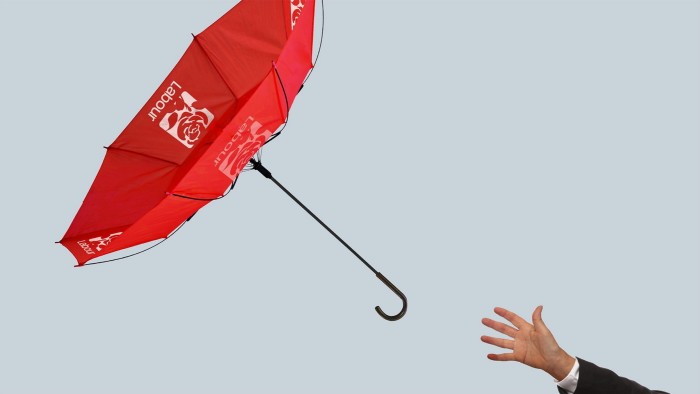Unlock the Editor’s Digest for free
Roula Khalaf, Editor of the FT, selects her favourite stories in this weekly newsletter.
This time last year, political expert and workmanlike right-back Gary Neville spoon-fed questions to Sir Keir Starmer as the pair ambled around the Lake District. A literal walk in the park of a conversation, in Wordsworth country, before a general election: as preparation for high office, it didn’t exude seriousness.
I can’t think of a less scrutinised incoming government than Labour in 2024. Naturally, it has melted upon contact with reality. Starmer’s latest capitulation to pressure from the left is to rewrite a welfare-reform bill that Labour MPs thought cruel. (The revised version passed a crunch vote on Tuesday.) He did the same with a planned cut to pensioner perks last month. He has withdrawn a supposedly nativist sentiment about immigration expressed some weeks ago.
Starmer is blamed for the chaos, and should be. He has the intelligence and work rate of a prime minister, but not the character. Whether against Jeremy Corbyn’s leadership of the party or against the dogmatic identity politics known as woke, he let braver colleagues lead the fight then swept in at the end as though he were with them all along. He has governed in that spirit.
If nothing else, Starmer’s brittleness should finish off the idea that a tough start in life must necessarily steel someone for adversity ever after. Yes, trauma can have that effect. But it can also instil the opposing characteristic: a heightened sensitivity, an understandable reluctance to volunteer for more struggle. The politicians I have covered who least minded conflict — Donald Trump, who relishes it, and David Cameron, who barely noticed it — were pampered as youths. Those of us from nearer the Starmer than Cameron end of things might wish the old trope were true, that pressure makes diamonds and so on, but the exceptions to this rule in public life are too stark.
What can be said for Starmer? At least one thing. He is preferable to his party. A great many of Labour’s MPs and activists are almost constitutionally incapable of making hard choices, about public money in particular. Britain’s sickness benefits bill contributes to the nation’s high debt, low growth and tax burden. Of all the ways of reducing it — such as cutting payments or limiting eligibility — none is painless. Perhaps this particular reform was misjudged in its details. But don’t assume that Labour MPs would have backed another one that made equivalent savings.
The likeliest alternative to Starmer within Labour is more tax and more debt to fund more (unproductive) spending. And an end to even nominal attempts to improve public sector efficiency. The government has a plan to reform the NHS, which includes the obligatory stuff about using computers a lot. I forecast the U-turn will commence in spring 2026. The Labour movement is not going to support anything that seriously incommodes the unions to benefit mere patients.
Even Tony Blair struggled to get modest public sector reforms past his party, and he was a political natural spending historic sums of cash as a sweetener. Starmer hasn’t a chance. This is a party that has spent 14 years blaming everything on Tory sadism. It has been encouraged in that children’s story by a sequence of leaders who have spent their entire thinking lives in either a soft left or hard left cocoon, of whom Starmer is the least worst.
If he is less of a problem than his party, so is Rachel Reeves. At no point has she ever really convinced as chancellor of the exchequer. But at least she has a passing interest in the core job of financial control. If taxpayers knew how many appeals she has to withstand for their cash, from morally blackmailing MPs or shroud-waving NGOs, they’d dread her removal. Go ahead and mock “Rachel from accounts”, but hers might be the last thumb in the dyke.
This apologia for the Labour leadership can’t be pushed too far. If anything, Starmer’s weakness is under-discussed. Not nearly enough is made of his maudlin tone in interviews. Some of his mood is warranted: hideous events have befallen him of late. The rest seems to be about the general roughness of politics. When Starmer tracks down whoever it was who forced him into this career, he should have a stern word.
But his policies, for the few weeks they last, suggest he understands certain realities better than his colleagues. Britain is not going back to its pre-2008 performance, which owed much to funny money in the City, a surge of public spending and the legacy effect of Thatcherite supply side reforms now partially undone or offset by red tape elsewhere. The country has not run a budget surplus since the turn of the millennium. It can’t borrow much more without risking investor confidence, or tax much more without weighing down on incentives. There is no way out that does not involve a more efficient state.
Starmer is too weak to enact that change. Much of his party is too blinkered to even see the need for it. Of the two dysfunctions, his is the less criminal. It is often said in defence of Labour now that it isn’t a Corbynite movement, “just” soft left. Well, soft left is too left for the work that Britain must do.
By the way, if taxes rise to fill the hole that Labour MPs have just opened by neutering the welfare and pensioner benefit cuts, and voters seethe, those MPs will stand by Starmer and Reeves, won’t they? That is the logical and honourable implication of their behaviour, surely? Don’t disappoint, comrades.
Read the full article here




